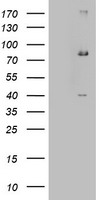EHHADH Mouse Monoclonal Antibody [Clone ID: OTI2C4]
CAT#: CF803072
Carrier-free (BSA/glycerol-free) EHHADH mouse monoclonal antibody, clone OTI2C4
Formulation: Standard
Other products for "EHHADH"
Specifications
| Product Data | |
| Clone Name | OTI2C4 |
| Applications | IHC, WB |
| Recommended Dilution | WB 1:500, IHC 1:150 |
| Reactivities | Human |
| Host | Mouse |
| Isotype | IgG1 |
| Clonality | Monoclonal |
| Immunogen | Human recombinant protein fragment corresponding to amino acids 496-723 of human EHHADH (NP_001957) produced in E.coli. |
| Formulation | Lyophilized powder (original buffer 1X PBS, pH 7.3, 8% trehalose) |
| Reconstitution Method | For reconstitution, we recommend adding 100uL distilled water to a final antibody concentration of about 1 mg/mL. To use this carrier-free antibody for conjugation experiment, we strongly recommend performing another round of desalting process. (OriGene recommends Zeba Spin Desalting Columns, 7KMWCO from Thermo Scientific) |
| Purification | Purified from mouse ascites fluids or tissue culture supernatant by affinity chromatography (protein A/G) |
| Conjugation | Unconjugated |
| Storage | Store at -20°C as received. |
| Stability | Stable for 12 months from date of receipt. |
| Predicted Protein Size | 79.3 kDa |
| Gene Name | Homo sapiens enoyl-CoA hydratase and 3-hydroxyacyl CoA dehydrogenase (EHHADH), transcript variant 1, mRNA. |
| Database Link | |
| Background | The protein encoded by this gene is a bifunctional enzyme and is one of the four enzymes of the peroxisomal beta-oxidation pathway. The N-terminal region of the encoded protein contains enoyl-CoA hydratase activity while the C-terminal region contains 3-hydroxyacyl-CoA dehydrogenase activity. Defects in this gene are a cause of peroxisomal disorders such as Zellweger syndrome. Two transcript variants encoding different isoforms have been found for this gene. [provided by RefSeq, Oct 2009] |
| Synonyms | ECHD; FRTS3; L-PBE; LBFP; LBP; PBFE |
| Reference Data | |
| Protein Pathways | beta-Alanine metabolism, Butanoate metabolism, Fatty acid metabolism, Limonene and pinene degradation, Lysine degradation, Metabolic pathways, PPAR signaling pathway, Propanoate metabolism, Tryptophan metabolism, Valine, leucine and isoleucine degradation |
Documents
| Product Manuals |
| FAQs |
Resources
| Antibody Resources |
{0} Product Review(s)
0 Product Review(s)
Submit review
Be the first one to submit a review
Product Citations
*Delivery time may vary from web posted schedule. Occasional delays may occur due to unforeseen
complexities in the preparation of your product. International customers may expect an additional 1-2 weeks
in shipping.






























































































































































































































































 Germany
Germany
 Japan
Japan
 United Kingdom
United Kingdom
 China
China





